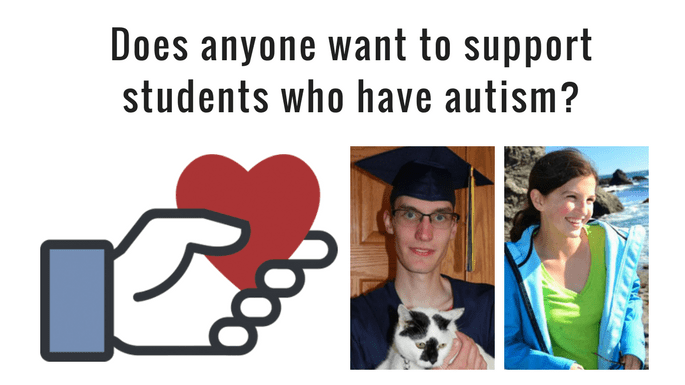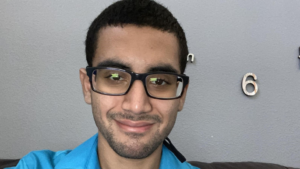This guest post is by Nils Skudra, a young man on the autism spectrum who has been accepted into University of North Carolina at Greensboro for his Masters! Nils is applying for the Spring 2020 Making a Difference Autism Scholarship via the nonprofit KFM Making a Difference started by me, Kerry Magro. I was nonverbal till 2.5 and diagnosed with autism at 4 and you can read more about my organization and how to apply for my scholarship here. I’m one guy trying to make a big difference for people with autism via this program. With that I hope you will take a minute to consider making a donation to our scholarship fund here so we can keep it running moving forward (the majority of our scholarship program is ran through donors from our community such as yourself so no matter if you could donate anything, whether it be $5 anywhere up to $5,000 it would be making a difference!).
I am a first-year graduate student in the Master’s in Library and Information Sciences program at the University of North Carolina at Greensboro, where I previously took a Master’s program in History from August 2016 to May 2018. As an individual with Asperger’s Syndrome, I have made substantial strides both in my personal life and in autism advocacy for the community.
Growing up on the autism spectrum has been a highly formative experience for me in many ways. When I was first diagnosed with Asperger’s Syndrome (commonly regarded today as high-functioning autism) at the age of 10, the doctors did not have a sufficient comprehension of what this condition fully entailed, and they assumed that I would never be able to develop into an intellectually and socially successful adult. Therefore they suggested to my mother that I might have to be institutionalized, a prospect which deeply frightened her, and consequently she did not tell me about my diagnosis until I was in high school. Nonetheless I exhibited different signs of being on the spectrum from an early age in spite of being unaware that these behaviors fell within a neurological condition. For example, I displayed a precocious interest in adult-level reading as an elementary school student while my peers’ interests were limited to reading that was pertinent to their age range, and by the age of five and a half I had already developed an intense and passionate fixation on the American Civil War, which formed the focus of the adult-level books that I delved into.
Another example of how my autistic diagnosis manifested itself from an early age was found in reactions from the parents of many of my peers. They told my mother that they did not feel comfortable having their children socialize with me since I was, in their words, a “genius.” This reference was clearly intended in a disparaging and envious way since they dreaded the prospect of someone in their children’s age range who displayed a higher level of intellectual curiosity and development. Although I did not realize it at this point, the attitude of these parents reflected the perception that many people have with regard to children on the autism spectrum, and I strongly believe in the importance of educating the public on these aspects of autism so that they will see the intellectual gifts of autistic individuals as traits which should be appreciated rather than envied and scorned.
When I finally learned about my Asperger’s diagnosis in high school, I was initially very alarmed and perplexed, worried that this might be some kind of disability or impairment that set me apart from other students. But as I acquired more information about Asperger’s and became more involved in the autism community, I came to recognize that while having this diagnosis entailed significant social challenges (such as difficulty with maintaining eye contact and catching other social interaction cues), it also included substantial strengths on an intellectual and personal level, such as the tendency to excel in a specialized area of interest; a tendency to voice directly what is one’s mind (even at the expense of other people’s liking, which can thus make this tendency a challenge as well); and an intensive concentration on completing tasks. Consequently I had to undergo IEP’s, regular physical and psychotherapy sessions, take theater classes and social skills groups to improve my social interaction skills, and work twice as hard as my other peers in order to succeed academically. These efforts paid off substantially since I graduated from UC Berkeley with a Bachelor of Arts in History, received a Master of Arts degree in History (with specialization in the Civil War/Reconstruction period) from the University of North Carolina at Greensboro, and am now enrolled in UNCG’s Master’s in Library and Information Sciences program.
While my experiences of growing up with autism have driven me to strive for academic and professional success, they have also played an important role in my relationship to the autism community since I understand how individuals on the spectrum face significant challenges with finding social acceptance and employment in the job market. Therefore I have also devoted my energy to freelance journalism as a form of autism advocacy, writing articles on depictions of autism in popular media and on employment opportunities for autistic individuals. These articles have been published in Pittverse Magazine and on the Art of Autism website, and they have received positive acclaim from readers. In addition, I helped to co-found Spectrum at UNCG, an organization for students on the spectrum, and we have held discussion panels on campus in which we talk about autism for the enlightenment of the student body. Through these endeavors, I feel that I have not only made a significant contribution to raising autism awareness in the community, but I have also helped fellow individuals with autism to develop greater self-confidence in their abilities for self-advocacy and social integration.

Follow Kerry’s journey on Facebook, his Facebook Fan Page, & Instagram!
Kerry Magro, a professional speaker and best-selling author who is also on the autism spectrum started the nonprofit KFM Making a Difference in 2011 to help students with autism receive scholarship aid to pursue a post-secondary education. Help us continue to help students with autism go to college by making a tax-deductible donation to our nonprofit here.
Also, consider having Kerry, one of the only professionally accredited speakers on the spectrum in the country, speak at your next event by sending him an inquiry here. If you have a referral for someone who many want him to speak please reach out as well! Kerry speaks with schools, businesses, government agencies, colleges, nonprofit organizations, parent groups and other special events on topics ranging from employment, how to succeed in college with a learning disability, internal communication, living with autism, bullying prevention, social media best practices, innovation, presentation best practices and much more!

We’d also appreciate if you could take a minute to create a Facebook Fundraiser to support our nonprofit’s scholarship fund! You can learn more about how you can do just that here.














